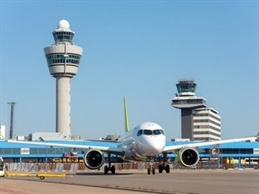The International Air Transport Association (IATA) and airlines are mounting a legal challenge to the Dutch government's "sudden decision" to reduce Schiphol airport's capacity.
Schiphol Airport is already restricted to 500,000 flights annually.
IATA said the Dutch government's decree would renege on that agreement, reducing Schiphol connectivity to 460,000 flights from November 2023.
IATA: Political decision behind move
"IATA and the global airline community believe that this political decision by the Dutch government contravenes EU Regulation 598/2014 on noise-related operating restrictions at EU airports," the IATA statement said.
The airline association also noted that this move also disregards the Chicago Convention, a binding international agreement to which the Netherlands is a signatory.
It said Annex 16 of the Convention contains provisions for The Balanced Approach to Aircraft Noise Management which states are obligated to follow when taking measures to manage the noise impacts of aviation.
IATA cited key requirements of the EU Regulation 598/2014 and the Balanced Approach, which are: consultation with affected parties; the use of flight reductions only as a last resort; and balancing the needs and concerns of local residents, the environment and the local economy for aviation's economic and social benefits.
"The decision to cut capacity at Schiphol fails to meet these requirements because no meaningful consultation was undertaken with industry; flight reductions are being imposed as a first resort rather than as a last resort," IATA said.
It added that the need to restore the economic damage to the aviation industry of the Netherlands is also not being addressed, as IATA cited that pre-pandemic, aviation supported some 330,000 jobs and $30 billion of economic activity in the Netherlands.
"The Netherlands is handicapping its economy by destroying connectivity. And it is doing it in contravention of EU law and its international obligations. The job-destroying hostile approach to aviation that the Dutch government has chosen is a totally disproportionate response to managing noise," commented Willie Walsh, IATA's director-general.
"The government has even refused to engage in meaningful consultations and made flight reductions the goal, rather than working with industry to meet noise and emissions reduction goals while restoring employment and revitalizing the post-pandemic economy. The dangerous precedent that this illegal approach creates left no choice but to challenge them in court," Walsh added.
Noise level, CO2 reduction measures
The airlines pointed out that they can reduce noise levels and CO2 emissions while also maintaining a network of destinations for the millions of passengers and tonnes of cargo they carry annually to and from Schiphol.
They also noted that the industry has already invested multi-billion euros in meeting near- and long-term goals in line with their own decarbonisation trajectories as well as government policies.
"The airline industry continually deploys quieter aircraft, reducing noise levels by 50% in the last decade. The investment in a new fleet also plays a significant role in meeting the aviation industry's commitment to reduce its CO2 emissions to net zero by 2050, as set out in a Resolution at the IATA AGM in 2021," the statement said.
It added that the industry's robust plan for reducing CO2 includes the uptake of Sustainable Aviation Fuels (SAF), of which airlines operating in and to the Netherlands have been among the leading users.
The Dutch government in February announced it would reduce Schiphol's capacity from 500,000 to 460,000 flight annual movements, with the ultimate goal of reducing flight movements to 440,000 by 2024.
In announcing the decision last month, majority state-owned Royal Schiphol Group — which operates the airport — said the flight reduction is a "necessary intermediate step" to balance Netherlands' connectivity to the world while looking after "air quality, noise pollution and the climate."
"Schiphol does, however, call upon the government to initiate a new Airport Traffic Decree, containing perspectives for both local residents and airlines, as soon as possible," it added.
"Schiphol believes that a new Airport Traffic Decree containing hard environmental limits should be initiated as soon as possible. Environmental limits that make it clear to the aviation sector what is and what is not possible. And there should also be room for reward within these limits when aviation proves to be quieter and cleaner," the airport said.




